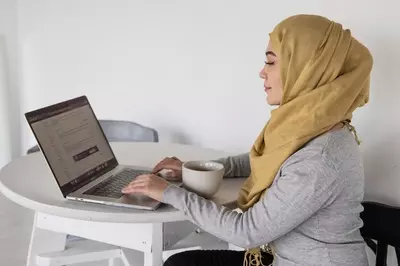
 As we increasingly spend more time online, from socializing with friends to making purchases and managing our finances, it can be helpful to think of the internet as part of our extended community.
As we increasingly spend more time online, from socializing with friends to making purchases and managing our finances, it can be helpful to think of the internet as part of our extended community.
In the same way we take precautions to protect ourselves when going about our daily activities outside our homes, we also should think about keeping ourselves secure online.
We should also monitor our emotions when we are online. Are our habits creating anxiety or impacting our self view? If so, it might be time to turn our technology off.
Protect your digital footprint
Every time you click, you are leaving a trace of your activity, which can sometimes include personal information. To protect this information:
- Use a strong, unique password for each website you visit
- Avoid sharing personal information on public forums
- Review the privacy settings for any website or social network you join, and follow their tips for a secure experience
The Center for Democracy & Technology has an excellent list of 10 steps you can take to further protect your digital privacy.
Recognize disinformation and scams
The sheer volume of information constantly churning out from cyberspace can be overwhelming, especially if you don't know how to separate what is true from what isn't. And while everything is prone to human error, disinformation refers to material you read or view that is false and intentionally designed to cause harm. This can range from fake news sites designed to make you believe that people with different identities are dangerous, to email scams hoping to lure you into giving your bank account information. The advent of deepfake videos, which look real – but aren't – is another use of technology to fool people online.
How do you learn to separate what is real from what isn't? You should always check verified sources, such as a trusted news outlet, to see if a particular story has been published in other places. The more a story is reported by multiple, non-biased outlets, the more likely it is to be true. You can check a Media Bias Chart to see whether a particular news outlet focuses on factual reporting or shows signs of political bias.
The International Federation of Library Associations and Institutions (IFLA) has a handy infographic to help remember critical questions to ask when you come across a piece of information online. Their guidance includes reviewing the source and author, checking your own biases, and considering whether the article is satire.
Reduce your 'internet stress'
From the fear of missing out (FOMO) when we see photos of a friend's party we had to miss, to experiencing cyberbullying, to feeling addicted to checking email, to developing a fear of the news – being online can sometimes create more anxiety than positive emotions.
This is normal and happens to everyone - but there are ways to mitigate it.
- Check in with your body. You may not even realize you are stressed or frightened until you pay attention to your body. Take a few unhurried, deep breaths, and acknowledge that you are having a reaction to an online stressor.
- Ignore and report bullies. If someone is harassing you online, don't engage with them. Block them, if possible, and report them to the site they are using to harass you. (If someone is making specific and credible threats, and you have reason to believe they know how to find you, call the police.)
- Use technology to relax. You can use apps like 10% Happier or Headspace to minimize stress, download a guided meditation, or participate in an online support group.
- Be intentional, not reactive. Know why you’re plugging in before you do it - for example, checking the weather or wishing a friend happy birthday. Don’t have a reason for connecting? Then put the device away for later.
Learning relaxation techniques can reduce feelings of stress and increase wellbeing. For many, the best way to promote feelings of security is simply to disconnect!


